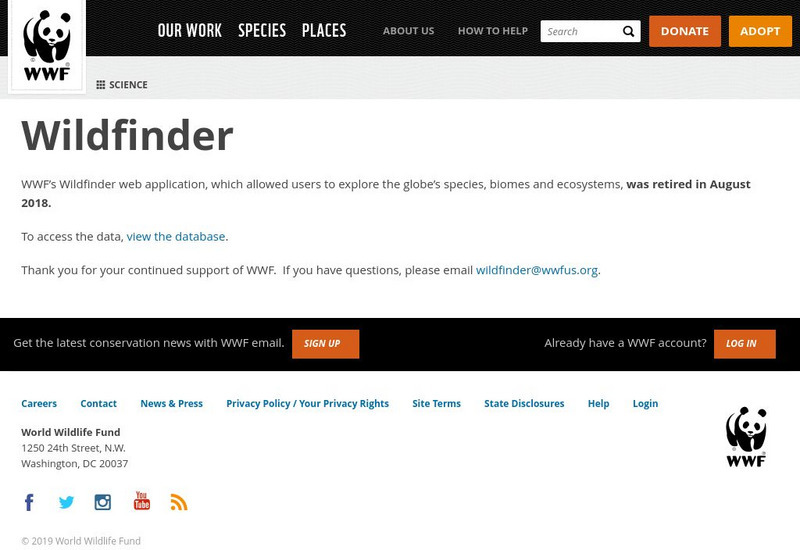Hi, what do you want to do?
Curated OER
Artificial Selection
The second lesson in the series begins with a starter activity discussing wild versus domesticated animals. Then, scholars play a card game, with optional variations, to emphasize artificial selection. Next, they attend a field trip to a...
American Museum of Natural History
Web of Life Game
Get caught in a web of learning. Classmates play a game to build a web to model the interaction of species that live in a specific ecosystem. They each assume the role of one species and work together, passing a ball of twine to indicate...
American Museum of Natural History
Life in the City
Believe it or not, biodiversity exists even in areas of disturbed habitat. An interactive activity challenges learners to look for species with a magnifying lens in an image of a city habitat. Pop-up images and descriptions explain how...
American Museum of Natural History
Going, Going...Gone?
Young environmentalists consider how scientists are attempting to save endangered species. They read about what causes extinction and steps to take to minimize the threats.
National Wildlife Federation
Links in the Chain of Life
A small little ant can have a large impact on its ecosystem. Young researchers explore the different species that live in a plains ecosystem. They find the characteristics of several species and then compare species to determine how...
Howard Hughes Medical Institute
Discovering the Wallace Line
When studying locations of specific species, interesting patterns emerge. Young scholars discover this as they plot the location of specific species on a group of islands. Patterns emerge as they identify the Wallace Line. They then...
Howard Hughes Medical Institute
Measuring Biodiversity in Gorongosa
Take your biology class' understanding of biodiversity to a whole new level! Ecology scholars use data to calculate three different diversity indices based on the organisms in the Gorongosa National Park. The four-part activity uses an...
Howard Hughes Medical Institute
Niche Partitioning Activity
Dinnertime on the African savanna is a highly choreographed event! Introduce young ecologists to the concept of niche partitioning through a hands-on activity. Pupils research animal behaviors and use data to develop an understanding of...
Howard Hughes Medical Institute
Human Impacts on Biodiversity
Have you always wanted to take your science class on an amazing field trip they will never forget? Now you can! Observe the wildlife in an African savanna through trail cameras with a five-part data analysis activity. Learners analyze...
Illinois Department of Natural Resources
Section Three: What's the Status of Biodiversity?
Biodiversity is essential for every habitat, but many species are at risk due to pollution and other factors. Explore several different species native to Illinois in a gallery walk with posters that learners have created after research...
ARKive
Adaptations for Movement
What animals are best suited for moving around a rainforest, or a desert? Design your own animal species based on a particular habitat, focusing on the characteristics it will need for optimal movement. Great as a group lesson or...
Curated OER
Species Charades
Students identify endangered species. In this endangered species lesson, the teacher leads a discussion about endangered species, then the class plays a game of charades to pantomime animal behavior.
Alabama Learning Exchange (ALEX)
Whales, Whales, Whales!
The title says it all! Help your pupils learn all about whales. Class members research different species of whales and share the information via video conferences with kids from another school. They conduct research on a selected species...
Curated OER
Animals
Students explore biology by participating in a science vocabulary activity. In this animal species lesson, students define a list of animal vocabulary terms as well as practice using them in sentences with the appropriate adjectives and...
Curated OER
Jay Play
Students explore animal characteristics by participating in a bird observation activity. In this blue jay identification lesson, students discuss the different types of blue jays native to their environment and bait them to come close...
Curated OER
Biome Project
In this earth science worksheet, students act as travel agents for a particular biome and construct a brochure to sell the class on benefits of taking a vacation to their biome. They include each of the features given in the exercise.
Curated OER
Native vs. Non-native Species: Who Will Win?
Students examine non-native species and the problems they have caused in the waters of the Chesapeake Bay. They create a "Wanted" poster for one of the species. They describe the effects of non-native species on the schoolyard species.
Curated OER
Animal Facts
Fourth graders list five facts about an assigned animal, and complete a bird beak activity, using pliers, blunt pencils, forceps, clothespins, and a spoon that represent different types of beaks; students complete chart showing best type...
Curated OER
Eco-Logical: A Coastal Logic Problem
Fourth graders study the characteristics of five coastal communities. They use logic cards and matching activities to identify the proper community for plant and animal species.
Other
Camp Silos: Exploring the Prairie
An excellent site for studying the Iowa prairie. Offers wonderful facts and interactive activities for students to do individually or as a group. Identifies national standards and lesson plans for the teaching of prairie life. Provides...
Other
Southern Nature: Scientific Views of the Colonial American South
These colonial members of the American Philosophical Society explored the southern colonies. Here you will see what they found to be of scientific importance. There are accounts of indigenous people, flora, and animal species.
Other
Colchester Zoo, England
This is the homepage of the Colchester Zoo in Colchester, England. There is information about the zoo and the animals. There is a virtual tour and there are real player and QuickTime videos under the "Display and Feeding Times" category.
American Museum of Natural History
American Museum of Natural History: O Logy: What's the Big Idea? Biodiversity
Find information about diversity among genes, species, and ecosystems that helps answer questions about the importance of biodiversity and how we can save species from extinction.
Other
Wild Finder: Mapping the World's Species
The World Wildlife Fund has created a searchable database containing thousands of species. Users can search by both species and location. Results are organized by their scientific name and include the common name, class, their threatened...




























